- DTC judgment completed
- System normal
| Last Modified: 07-31-2024 | 6.11:8.1.0 | Doc ID: RM100000001GH9I |
| Model Year Start: 2020 | Model: Corolla | Prod Date Range: [01/2019 - 03/2019] |
| Title: 2ZR-FAE (ENGINE CONTROL): SFI SYSTEM: P0037,P0038,P0141,P102D; Oxygen Sensor Heater Control Circuit Low (Bank 1 Sensor 2); 2020 MY Corolla [01/2019 - 03/2019] | ||
|
DTC |
P0037 |
Oxygen Sensor Heater Control Circuit Low (Bank 1 Sensor 2) |
|
DTC |
P0038 |
Oxygen Sensor Heater Control Circuit High (Bank 1 Sensor 2) |
|
DTC |
P0141 |
Oxygen Sensor Heater Circuit (Bank 1 Sensor 2) |
|
DTC |
P102D |
O2 Sensor Heater Circuit Performance Bank 1 Sensor 2 Stuck ON |
DESCRIPTION
In order to obtain a high purification rate of the carbon monoxide (CO), hydrocarbon (HC) and nitrogen oxide (NOx) components in the exhaust gas, a TWC (Three-Way Catalytic Converter) is used. For the most efficient use of the TWC, the air fuel ratio must be precisely controlled so that it is always close to the stoichiometric air fuel level. For the purpose of helping the ECM to deliver accurate air fuel ratio control, a heated oxygen sensor is used.
The heated oxygen sensor is located behind the TWC, and detects the oxygen concentration in the exhaust gas. Since the sensor is integrated with the heater that heats the sensing portion, it is possible to detect the oxygen concentration even when the intake air volume is low (the exhaust gas temperature is low).
When the air fuel ratio becomes lean, the oxygen concentration in the exhaust gas is high. The heated oxygen sensor informs the ECM that the post-TWC air fuel ratio is lean (low voltage, i.e. less than 0.45 V).
Conversely, when the air fuel ratio is richer than the stoichiometric air fuel level, the oxygen concentration in the exhaust gas is low. The heated oxygen sensor informs the ECM that the post-TWC air fuel ratio is rich (high voltage, i.e. higher than 0.45 V). The heated oxygen sensor has the property of changing its output voltage drastically when the air fuel ratio is close to the stoichiometric level.
The ECM uses the supplementary information from the heated oxygen sensor to determine whether the air fuel ratio after the TWC is rich or lean, and adjusts the fuel injection duration accordingly. Thus, if the heated oxygen sensor is working improperly due to internal malfunctions, the ECM is unable to compensate for deviations in the primary air fuel ratio control.
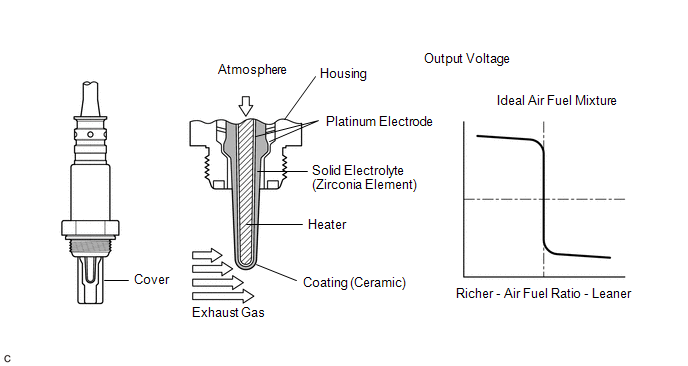
HINT:
- When any of these DTCs are stored, the ECM enters fail-safe mode. The ECM turns off the heated oxygen sensor heater in fail-safe mode. Fail-safe mode continues until the ignition switch is turned off.
-
The heated oxygen sensor heater circuit uses a relay on the +B side of the circuit.
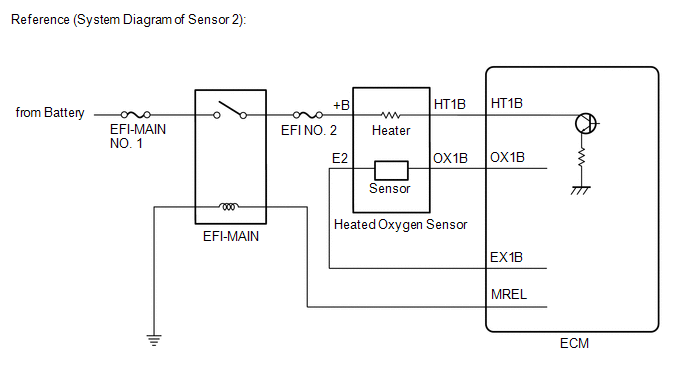
|
DTC No. |
Detection Item |
DTC Detection Condition |
Trouble Area |
MIL |
Memory |
|---|---|---|---|---|---|
|
P0037 |
Oxygen Sensor Heater Control Circuit Low (Bank 1 Sensor 2) |
Heated oxygen sensor heater current is the specified value or less while the heater is operating (1 trip detection logic). |
|
Comes on |
DTC stored |
|
P0038 |
Oxygen Sensor Heater Control Circuit High (Bank 1 Sensor 2) |
Heated oxygen sensor heater current reaches high limit (1 trip detection logic). |
|
Comes on |
DTC stored |
|
P0141 |
Oxygen Sensor Heater Circuit (Bank 1 Sensor 2) |
The cumulative heater resistance correction value exceeds the threshold (2 trip detection logic). |
|
Comes on |
DTC stored |
|
P102D |
O2 Sensor Heater Circuit Performance Bank 1 Sensor 2 Stuck ON |
Heated oxygen sensor heater current is higher than the specified value while the heater is not operating (1 trip detection logic). |
|
Comes on |
DTC stored |
MONITOR DESCRIPTION
The sensing portion of the heated oxygen sensor has a zirconia element which is used to detect the oxygen concentration in the exhaust gas. If the zirconia element is at the appropriate temperature, and the difference between the oxygen concentrations surrounding the inside and outside surfaces of the sensor is large, the zirconia element generates voltage signals. In order to increase the oxygen concentration detecting capacity of the zirconia element, the ECM supplements the heat from the exhaust with heat from a heating element inside the sensor.
Heated Oxygen Sensor Heater Range Check (P0037, P0038 and P102D):
-
The ECM monitors the current applied to the heated oxygen sensor heater to check the heater for malfunctions.
If the heater current is outside the normal range, the signal transmitted by the heated oxygen sensor becomes inaccurate. When the current in the heated oxygen sensor heater is outside the normal operating range, the ECM interprets this as a malfunction in the sensor heater and stores a DTC.
Heated Oxygen Sensor Heater Performance (P0141):
- After the accumulated heater on time exceeds 100 seconds, the ECM calculates the heater resistance using battery voltage and the current applied to the heater. If the resistance is above the threshold value, the ECM determines that there is a malfunction in the heated oxygen sensor heater and stores DTC P0141.
MONITOR STRATEGY
|
Related DTCs |
P0037: Heated oxygen sensor heater range check (low current) P0038: Heated oxygen sensor heater range check (high current) P0141: Heated oxygen sensor heater performance P102D: Heated oxygen sensor heater performance |
|
Required Sensors/Components (Main) |
Heated oxygen sensor heater |
|
Required Sensors/Components (Related) |
- |
|
Frequency of Operation |
Continuous: P0037, P0038, P102D Once per driving cycle: P0141 |
|
Duration |
10 seconds: P0141 2.064 seconds: P0038 0.5 seconds: P0037, P102D |
|
MIL Operation |
Immediate: P0037, P0038, P102D 2 driving cycles: P0141 |
|
Sequence of Operation |
None |
TYPICAL ENABLING CONDITIONS
P0037
|
All of the following conditions are met |
- |
|
Battery voltage |
10.5 V or higher |
|
Time after heater on |
10 seconds or more |
|
Learned heater off current operation |
Completed |
|
Learned heater off current operation |
Succeeded |
|
Oxygen sensor heater high current fail (P0038) |
Not detected |
|
Engine |
Running |
|
Starter |
Off |
|
Catalyst active air fuel ratio control |
Not operating |
|
Heater on current - Learned heater off current |
Less than 0.15 A |
|
Command to heater output |
ON |
|
Heater off current |
3.5 A or higher |
P0038
|
Monitor runs whenever the following DTCs are not stored |
None |
|
All of the following conditions are met |
- |
|
Battery voltage |
10.5 V or higher |
|
Time after heater on |
10 seconds or more |
|
Learned heater off current operation |
Completed |
|
Engine |
Running |
|
Starter |
Off |
|
Catalyst active air fuel ratio control |
Not operating |
|
Heater off current |
Less than 3.5 A |
P0141
|
All of the following conditions are met |
- |
|
Oxygen sensor heater circuit fail (P0037, P0038, P102D) |
Not detected |
|
Battery voltage |
10.5 V or higher |
|
Fuel cut |
Off |
|
Time after fuel cut on to off |
30 seconds or more |
|
Accumulated heater on time |
100 seconds or more |
|
Learned heater off current operation |
Completed |
|
Duration that heated oxygen sensor impedance is less than 15 kΩ |
2 seconds or more |
P102D
|
All of the following conditions are met |
- |
|
Battery voltage |
10.5 V or higher |
|
Time after heater on |
10 seconds or more |
|
Learned heater off current operation |
Completed |
|
Oxygen sensor heater low current fail (P0037) |
Not detected |
|
Oxygen sensor heater high current fail (P0038) |
Not detected |
|
Engine |
Running |
|
Starter |
Off |
|
Catalyst active air fuel ratio control |
Not operating |
|
Heater current detected by heater monitor IC |
4 A or higher |
TYPICAL MALFUNCTION THRESHOLDS
P0037 (Case1)
|
Heater on current - Learned heater off current |
Less than 0.15 A |
P0037 (Case2)
|
Heater on current |
Less than 1 A |
P0038
|
Both of the following conditions are met |
- |
|
Heater current detected by heater monitor IC |
4 A or higher |
|
Command to heater output |
ON |
P102D
|
Heater on current |
1 A or higher |
P0141
|
Heater resistance |
Varies with sensor element temperature (Example: Higher than 23 Ω) |
MONITOR RESULT
Refer to detailed information in Checking Monitor Status.
P0141: O2 Sensor Heater / O2 HEATER B1S2
|
Monitor ID |
Test ID |
Scaling |
Unit |
Description |
|---|---|---|---|---|
|
$42 |
$91 |
Multiply by 0.001 |
Ohm |
Oxygen sensor heater resistance bank 1 sensor 2 |
CONFIRMATION DRIVING PATTERN
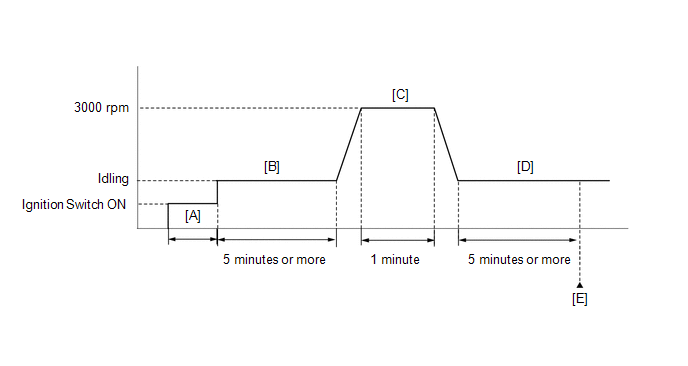
- Connect the Techstream to the DLC3.
- Turn the ignition switch to ON.
- Turn the Techstream on.
- Clear the DTCs (even if no DTCs are stored, perform the clear DTC procedure).
- Turn the ignition switch off and wait for at least 30 seconds.
- Turn the ignition switch to ON [A].
- Turn the Techstream on.
- Start the engine and idle it for 5 minutes or more [B].
- With the vehicle stationary, depress the accelerator pedal and maintain an engine speed of 3000 rpm for 1 minute [C].
- Idle the engine for 5 minutes or more [D].
- Enter the following menus: Powertrain / Engine and ECT / Trouble Codes [E].
-
Read the pending DTCs.
HINT:
- If a pending DTC is output, the system is malfunctioning.
- If a pending DTC is not output, perform the following procedure.
- Enter the following menus: Powertrain / Engine and ECT / Utility / All Readiness.
- Input the DTC: P0037, P0038, P0141 or P102D.
-
Check the DTC judgment result.
Techstream Display
Description
NORMAL
ABNORMAL
- DTC judgment completed
- System abnormal
INCOMPLETE
- DTC judgment not completed
- Perform driving pattern after confirming DTC enabling conditions
N/A
- Unable to perform DTC judgment
- Number of DTCs which do not fulfill DTC preconditions has reached ECU memory limit
HINT:
- If the judgment result shows NORMAL, the system is normal.
- If the judgment result shows ABNORMAL, the system has a malfunction.
- If the judgment result shows INCOMPLETE or N/A, perform steps [B] through [E] again.
-
If no pending DTC is output, perform a universal trip and check for permanent DTCs.
HINT:
- If a permanent DTC is output, the system is malfunctioning.
- If no permanent DTC is output, the system is normal.
WIRING DIAGRAM
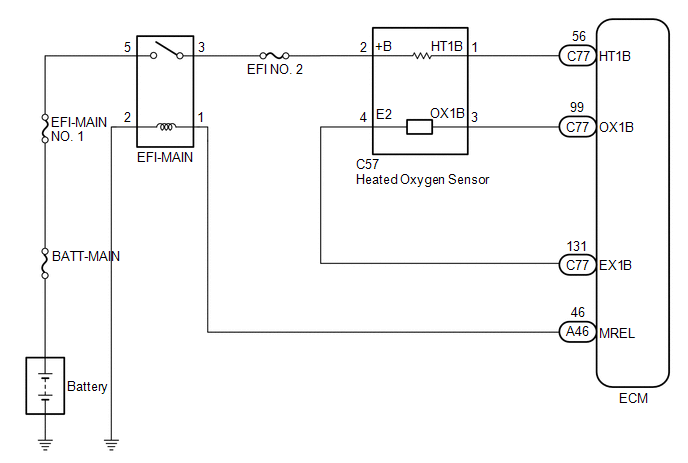
CAUTION / NOTICE / HINT
NOTICE:
Inspect the fuses for circuits related to this system before performing the following procedure.
HINT:
- Sensor 1 refers to the sensor closest to the engine assembly.
- Sensor 2 refers to the sensor farthest away from the engine assembly.
- Refer to "Data List / Active Test" [O2 Heater B1S2 and O2 Heater Curr Val B1S2].
- When the values for the Data List items O2 Heater Curr Val B1S2 is not 0 A, the heaters are on.
-
Change the fuel injection volume using the Control the Injection Volume for A/F Sensor function provided in the Active Test and monitor the heated oxygen sensor output voltage (Click here
![2020 MY Corolla [01/2019 - 03/2019]; 2ZR-FAE (ENGINE CONTROL): SFI SYSTEM: P0136-P0139,P013A; O2 (A/F) Sensor Circuit (Bank 1 Sensor 2)+](/t3Portal/stylegraphics/info.gif) ). If the sensor output voltage does not change (almost no reaction) while performing the Active Test, the sensor may be malfunctioning.
). If the sensor output voltage does not change (almost no reaction) while performing the Active Test, the sensor may be malfunctioning.
- Read Freeze Frame Data using the Techstream. The ECM records vehicle and driving condition information as Freeze Frame Data the moment a DTC is stored. When troubleshooting, Freeze Frame Data can help determine if the vehicle was moving or stationary, if the engine was warmed up or not, if the air fuel ratio was lean or rich, and other data from the time the malfunction occurred.
PROCEDURE
|
1. |
INSPECT HEATED OXYGEN SENSOR (HEATER RESISTANCE) |
(a) Inspect the heated oxygen sensor.
HINT:
Perform "Inspection After Repair" after replacing the heated oxygen sensor.
| NG |

|
|
|
2. |
CHECK TERMINAL VOLTAGE (POWER SOURCE OF HEATED OXYGEN SENSOR) |
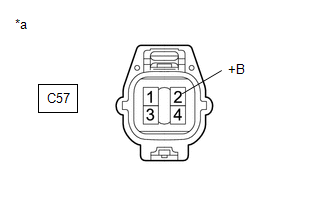
|
*a |
Front view of wire harness connector (to Heated Oxygen Sensor) |
(a) Disconnect the heated oxygen sensor connector.
(b) Turn the ignition switch to ON.
(c) Measure the voltage according to the value(s) in the table below.
Standard Voltage:
|
Tester Connection |
Condition |
Specified Condition |
|---|---|---|
|
C57-2 (+B) - Body ground |
Ignition switch ON |
11 to 14 V |
| NG |

|
REPAIR OR REPLACE HARNESS OR CONNECTOR (HEATED OXYGEN SENSOR - EFI-MAIN RELAY) |
|
|
3. |
CHECK HARNESS AND CONNECTOR (HEATED OXYGEN SENSOR - ECM) |
(a) Disconnect the heated oxygen sensor connector.
(b) Disconnect the ECM connector.
(c) Measure the resistance according to the value(s) in the table below.
Standard Resistance:
|
Tester Connection |
Condition |
Specified Condition |
|---|---|---|
|
C57-1 (HT1B) - C77-56 (HT1B) |
Always |
Below 1 Ω |
|
C57-1 (HT1B) or C77-56 (HT1B) - Body ground and other terminals |
Always |
10 kΩ or higher |
| NG |

|
REPAIR OR REPLACE HARNESS OR CONNECTOR |
|
|
4. |
CLEAR DTC |
(a) Connect the Techstream to the DLC3.
(b) Turn the ignition switch to ON.
(c) Turn the Techstream on.
(d) Clear the DTCs.
Powertrain > Engine and ECT > Clear DTCs
(e) Turn the ignition switch off and wait for at least 30 seconds.
|
|
5. |
CHECK WHETHER DTC OUTPUT RECURS (DTC P0037, P0038, P0141 OR P102D) |
(a) Drive the vehicle in accordance with the driving pattern described in Confirmation Driving Pattern.
(b) Enter the following menus: Powertrain / Engine and ECT / Trouble Codes.
(c) Read the pending DTCs.
Powertrain > Engine and ECT > Trouble Codes
|
Result |
Proceed to |
|---|---|
|
DTCs are not output |
A |
|
DTC P0037, P0038, P0141 or P102D is output |
B |
| A |

|
| B |

|
|
|
|
